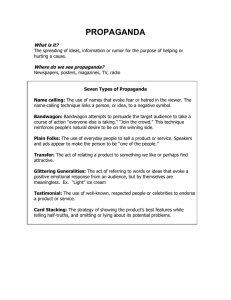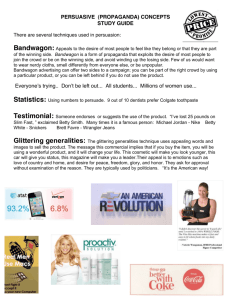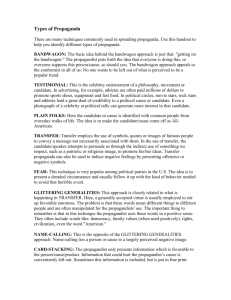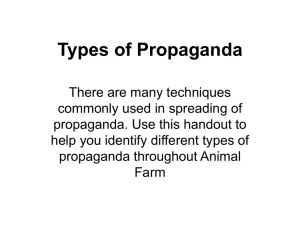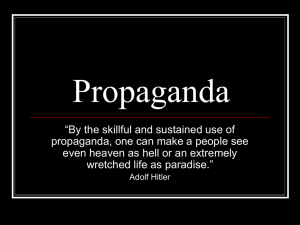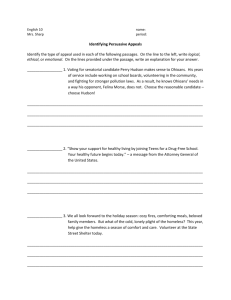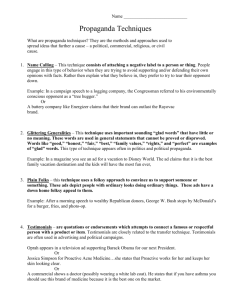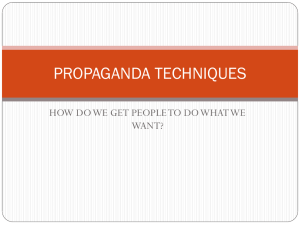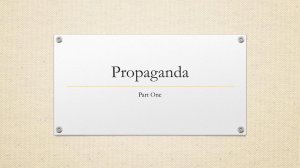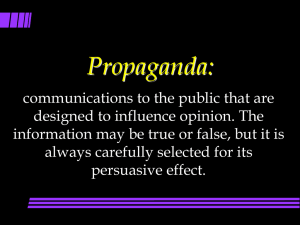Pesky Propaganda
advertisement
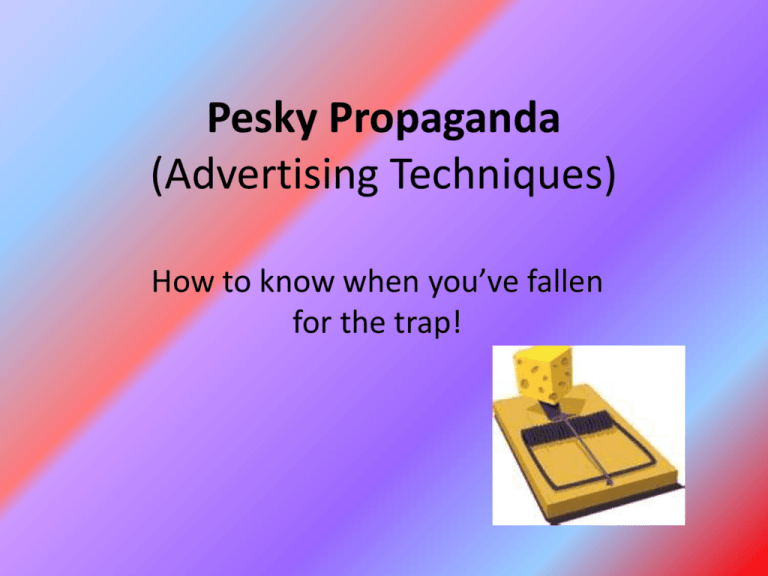
Pesky Propaganda (Advertising Techniques) How to know when you’ve fallen for the trap! What is Propaganda? • Propaganda—information, ideas, or rumors deliberately spread to help or harm a person, group, movement, institution, nation, etc. • Deliberately designed to influence opinions or actions of other individuals or groups. Common Propaganda Devices • • • • • • • • • • Bandwagon Avant-Garde (Individuality) Testimonial Facts and Figures Transfer Glittering Generalities Name Calling Plain Folks Snob Appeal Logical Fallacy Bandwagon • Tries to make us “follow the crowd.” • It’s the “everybody’s doing it” ploy. Jump on the bandwagon or you’ll be left behind! • PEER PRESSURE! McDonald’s 1980s Avant-Garde (Individuality) • The opposite of Bandwagon. • Appeals to your desire to be different, independent, rebellious, or celebrate your own style. Samsung Nokia Testimonial • Tries to make us accept something by getting statements or endorsements from prominent or famous people. • The point to remember is that no person’s opinion is particularly valuable except in that person’s field of work. • Example: Tiger Wood’s opinion of a golf club is worth more than his opinion of a razor. Weight Watchers Advil Facts and Figures • Used when the propagandist only wants us to know part of the truth. • Numbers and statistics are used to persuade the audience. • Example, a car repair shop might say that their technicians have an average of 5 years’ experience. What they don’t tell you is that they have 1 technician with 25 years’ experience and 4 with none. Covergirl mascara Raisin Bran Crest Transfer • Tries to transfer the authority, credibility, prestige or good feelings of something we already respect and admire to something the propagandist would have us accept. • Goal—to get you to link the subject or product to positive feelings you already have about something else. • Symbols such as the cross, the American flag, Uncle Sam, or scenes of people having fun using a product are often used in transfer ploys. 1980 Reagan campaign speech Sprite Pepsi Name-Calling • Gives bad names (or reputations) to the individuals, groups, nations, races, policies, beliefs, and ideals which the propagandist would have us condemn or reject. • Causes us to form a judgment without first examining the evidence. • Appeals to hate and/or fear. Abbott Governor ad 2014 Just Like Obama 2012 Obama campaign ad—BB Glittering Generalities • Suggests “shining ideals.” • As name-calling seeks to make us reject something, glittering generalities try to make us accept and approve…without first examining the evidence. • Beware of words that have a positive connotation that can make you trust the message and what it stands for: – – – – – – – – – – Freedom Loyalty The American Way Love Family Change Hope Home-style Hand-made Organic Herman Cain political ad 2012 McCain v. Obama comparison 2012 Plain Folks • Often used by politicians and businesses; tries to win our confidence by appearing to be common people just like us. • During election time, you’ll see candidates doing ordinary activities like walking a dog, exercising, or playing with his/her children. • Gives the impression of being a “regular guy” or that the product is loved by regular people. Barnet Shale Snob Appeal • The opposite of Plain Folks. • Tries to make you think that only the best, most beautiful, or most elite people will possess or support a particular product or ideal. • Mercedes or Rolex • Gold Cards • Platinum Cards American Express Gold Jaguar/Brits Logical Fallacy • A purposeful error in reasoning. • Used to persuade or trick someone. • If A=B, and B=C, then A must = C! DirectTV Old Spice
